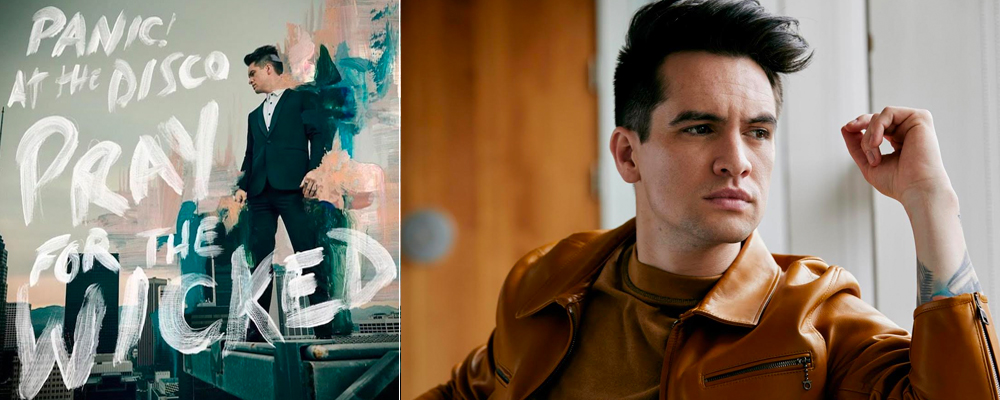Panic! At the Disco’s ‘Pray For the Wicked’ Is Musical Theater For Emo Kids
Adi Mehta
Panic! At the Disco has dabbled in electronic dance rock, and assumed a variety of forms within the genre over the years, often suffering to recover from the dreaded “emo” label. The only consistent member, Brendon Urie, having rebounded from a starring role in “Kinky Boots” on Broadway, has recently reinvented himself as something of a song-and-dance man, while still retaining the adolescent aesthetic with which he is widely identified. Under the circumstances, his latest offering, “Pray For the Wicked,” is everything that you would expect: a festive, theatrical set of songs that channels teenage sensibilities into large-scale pop production.
The record begins with “(Fuck a) Silver Lining,” certainly an interesting choice for an opener. There’s no buildup of any sorts, just the opening line, upon which Urie dives right into the rather awkward, theatrical megapop business that he goes on to keep coming for the album’s duration. Urie is thirty-two now, but has mastered the art of sounding like a teenager, with his strained, adolescent voice always coming across as two parts enthusiasm and one part melody. The song seems designed for the ADHD listener, with everything condensed and streamlined, presented with balloons and fireworks. You have to hand it to Urie for originality though — kind of. The strangeness of the opener betrays a unique boldness and commitment to artistic whimsy.
“Say Amen (Saturday Night)” has drumline stylings and big bursts of brass, with Urie sounding freshly emerged from the theater circuit and born again. He sounds like a wide-eyed optimist, of sorts, and it’s hard to imagine him singing the song without a complete dance routine. The end of the song is a high point, with him shifting in and out of falsetto with an epic, confident, fluidity that certainly makes an impact. “Hey Look Ma, I Made It,” on the other hand starts off sounding exactly the opposite, like the nervous half-singing that you see people do in clubs, while moving their shoulders ever so slightly. Upon the titular line, he starts bellowing, but something still seems a little off. Still, the cheeriness of the song is laudable, if your suspension of disbelief is up to par. The “Mama” references continue on “High Hopes,” and it’s sweet, although it would seem considerably more appropriate if Urie were in junior high. The song is a supersized pop production, massive, stadium pop fare. Skittering trap drums and a “Penny Lane” trumpet are nice touches.
“King of the Clouds” begins with an Eastern-type wheezing noise, and opens into a verse that showcases Urie for once sounding confident and completely at home. It’s an example of some fine songsmithing, one of the catchiest moments of the album, succeeding in transporting you to bygone eras, and allowing you to relive all the nostalgic festivity that such eras conjure. The song is another big, elaborate production, with several tempo changes that serve to make the song more of a “journey” than some of the more vapid, forced numbers on the record. “Dancing’s Not a Crime,” on the other hand, doesn’t quite live up to its predecessor, although you have to somewhat appreciate the colorful festivity of the number. “One of the Drunks” features more flat singing and stilted arrangements. There’s a bit when Urie sings, “‘round and ‘round and ‘round,” however, that is dense, layered, dynamic, and refreshing. As much as he might rehash the same drivel, he occasionally stumbles upon something truly exhilarating.
“Overpass” is a sure standout, with busy, momentous percussion and a motown feel, masterfully executed. It’s instantly catchy, with an interesting arrangement, and Urie consistently sounding on top of his game. “King of the Clouds” is a one-of-a kind track, with a chorus of Uries engaged in rich, multi-layered harmonies. There’s a gospel feel, which only escalates as the song develops, with mysterious high-pitched sounds that seem to be reaching for the heavens. It’s an ambitious undertaking that breathes some life into a format that has, at this point, become a little tired. “Old Fashioned” begins with an infectious little rhythm, and it’s something of a shame that Urie is so quick to truncate it, in the overall ADHD spirit of the album. Everything seems like a mad rush toward the hook, and when the hook finally comes, it sounds like a joke of a joke, in all its bafoonish, unrestrained theatricality. Closer “Dying in LA” takes a welcome break from the brass bursts and flamboyant song-and-dance routines, ending with a piano-driven and string-laden number. Urie does a little thing with the “y” sound in the word “dying,” that serves as a delightful example of how silly, whimsical quirks can make a song. After all the bombast and bluster that preceded it, this relatively understated song brings the album to closure quite elegantly.
If the “love it or hate it” cliche ever held any truth at all, Panic! At the Disco might be the ideal candidate. This album will likely make you either grin widely and prance around the room, or cringe unbearably, scream in frustration, and kick the wall. At any rate, “Pray For the Wicked” certainly marks a bold artistic progression and embodies a coherent, well-realized aesthetic. The “emo”-turned musical theater posturing has somehow never quite made its way into popular culture, and you’ve got to hand it to Urie for making it happen.
“Pray For the Wicked” is available June 22 on Apple Music.

